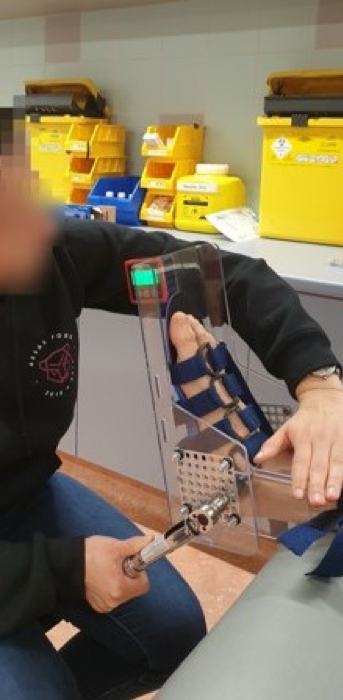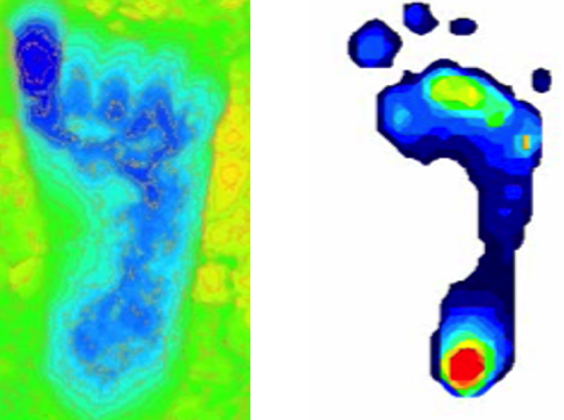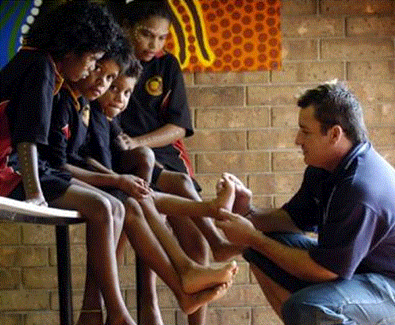World-leading research finds a link between poor foot health and its prevalence in Aboriginal and Torres Strait Islander peoples.
For Aboriginal and Torres Strait Islander peoples, poor foot health is commonly thought to just be a result of diabetes or smoking.
But Associate Professor James Charles has gone one step further to investigate the evolutionary prevalence of equinus – limited range of motion bending the ankle joint upward toward the body – in Aboriginal and Torres Strait Islander peoples.
He’s using origins as a clinical podiatrist treating Aboriginal and Torres Strait Islander peoples to explore and prevent the impact of equinus on increased forefoot pressure, if movement is restricted at the ankle, this will increase foot pressure, which often leads to ulceration, infection and amputation.
Community-owned knowledge and research
A/Prof Charles is a proud Kaurna man from the Adelaide Plains in South Australia who coordinates the Master of Public Health degree at Deakin University’s National Indigenous Knowledges Education Research and Innovation (NIKERI) Institute.
His ethos relies on working with and for Aboriginal and Torres Strait Islander people to improve their health.
“Research should really be and is community-owned. At the end of the day, the research I do is part of the Aboriginal people who it is being collected from.
“While trying to get some kind of improvement, there really has to be community ownership and collaboration, otherwise it’s not going to work.
“It’s research for and with Aboriginal and Torres Strait Islander peoples.”
Through meeting with community, A/Prof Charles examined how the foot biomechanics of Aboriginal and Torres Strait Islander people differs from non-Aboriginal people, and therefore creates more issues as they age.
Meaning, this work is critical in understanding who is at-risk to ensure they are treated early on and regularly.
Using clinical assessment, he responded to this knowledge by creating a device, the Dorsi-Meter, to identify and measure equinus.
In a recent study, he found that about 90 percent of Aboriginal and Torres Strait Islander men and 50 percent of Aboriginal and Torres Strait Islander women had this limited range of ankle joint motion in this sample.

His research paves the way for the next step towards prevention to offload forefoot pressure and consequential health issues.
Not only ‘set-and-forget’ treatments like shoe inserts or stretches are needed, but regular, ongoing treatment – especially for Aboriginal and Torres Strait Islander people who are more at-risk.
Beyond the numbers, this work must be a collaborative, empathetic process.
“No matter how quantitative the data is, you can always give a voice to the Aboriginal and Torres Strait Islander participant, to ask how do you feel about this and how is your foot health affecting you?”
Footprints on past and present
As A/Prof Charles continued to gather knowledge and learn he was given the opportunity to assess ancient footprints at Lake Mungo, which are more than 21,000 years old.
There, these footprints were 3D-scanned and made into casts to compare against Aboriginal and Torres Strait Islander people’s feet today.

“I’m really grateful and honoured to get the opportunity to go to Lake Mungo. We found – in terms of range of motion in the foot and arch height – the results were almost the same as the data we’re looking at today.”
Using GSP data from the National Rugby League, A/Prof Charles was even able to plot the run of Melbourne Storm Aboriginal player, Josh Addo-Carr.
Reflecting on the footprints of the past, he found the athleticism of today’s present.
Josh Addo-Carr form Storm has clocked the fastest speed ever recorded in rugby league and any other Australia sport. A phenomenal 38.5 km/hr during a game for Melbourne Storm.
“It’s interesting how a great Aboriginal athlete of today is mapping the same stride length of the Aboriginal people at Lake Mungo twenty-one thousand years ago.”
Ultimately, A/Prof Charles was able to see the athleticism that has been carried across generations for thousands of years of living on Country with survival skills, hunting and games continuing to be vital aspects of everyday life.
Over the years, his interest in identifying younger people who may be at-risk has only grown.
With an understanding that these symptoms of infection, ulceration and amputation are more likely as people age, this kind of prevention could help podiatrists get a step ahead.

“In other words, they might be a great athlete at the moment, but this risk can present itself as they get older and heavier. So, it’s really about what can we do to prevent problems for them in the future.”
A clinical impact
Since completing his PhD in 2016, A/Prof Charles has worked tirelessly to show the value of foot health and podiatry services for Aboriginal and Torres Strait Islander peoples.
Now, he is eager to see the clinical translation of his work, which is not currently being implemented.
“I would like to see ankle joint range of motion testing as part of any new patient assessment for any Aboriginal or Torres Strait Islander person that comes to a clinic – especially any person that is pre-diabetic or has diabetes – to identify those at-risk and measure overtime.
“It’s really about seeing at-risk people on a regular basis; having better funded, local, culturally inclusive medical services and training more Aboriginal or Torres Strait Islander podiatrist or foot health practitioners.
“I think that is all part of the solution.”
Associate Professor James Charles is a proud Kaurna man from the Adelaide Plains in South Australia who coordinates the Master of Public Health degree at Deakin University’s National Indigenous Knowledges Education Research and Innovation (NIKERI) Institute.



